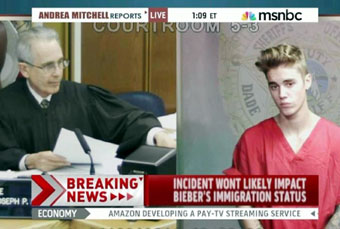
This Just In (Or, How to Break the News)
By R. Alan Clanton | published Sunday, January 26, 2014 |
Thursday Review editor
Yes, those rumors are true. A few days ago on MSNBC, reporter Andrea Mitchell was indeed forced to interrupt an interview with U.S. Representative Jane Harman (D-CA) who was standing there live in Davos discussing, among other small matters, the NSA’s massive surveillance program and the data harvesting designed to track cell phone and land line calls of Americans.
The reason for the sudden, abrupt derailment of this narrative: terrorism in Sochi? A new deal between Republicans and Democrats for a balanced budget? Improvements to the Health Care laws? Dow falling off a cliff? Nope to all of those.
Andrea Mitchell cut off the Congresswoman to take the erudite and learned daytime viewers of MSNBC to a live arraignment in Miami, where teen star Justin Bieber was facing a Dade County judge for the first time since his arrest for drunk driving.
Yes. For a brief moment the ghost of Paddy Chayefsky could be seen looming there in the MSNBC studios, a ghastly, partially decayed phantasm nevertheless smiling broadly at his prescience and ultimate vindication. When one sees the clip for the first time, one can almost hear the argument, from somewhere back in a half-lit production control room, between the craggy, deeply lined William Holden and the manically energized Faye Dunaway.
More than a victory for Chayefsky, it was yet another battle won for a world beholden to Google and its all-powerful rankings, which now—or so it seems—rattle, skew, and otherwise reorder the world of “real-time content,” once called quaintly “the news.”
This just in. This Justin.
Young Bieber’s bond hearing was, at that instant, far more important in the grand scheme of things than any of the mundane matters facing U.S. citizens…or the average Janes and Joes around the world, for that matter, facing issues of global warming (or global cooling), industrial development, jobs, women’s rights, economic solvency or violent jihad.
And somewhere among the producers and directors off camera, in that twilight of electronic eeriness, headset chatter, multiscreen Sony and JVC displays, glassy reflections and digital illumination, a decision was made—and made easily. Justin trumps the NSA, or Syria, or Sochi, or school lunches, or cyber-terror.
That Mitchell used the appropriate newsfeed chatter for the jarring transition—we have breaking news from Miami—is in itself an indication of the “broken” nature of news in general.
Justin trumps everything. Except Miley, Lindsay, Brittney, Kanye, the Kardashians, et al. And even that great flowing river of egalitarianism and enlightened liberalism at MSNBC could not escape the physics, the awesome attraction.
And by attraction I don’t mean "the bearded lady” at the circus, nor do I mean something along the lines of “Andrea Mitchell is attractive,” concepts easily punctured these days by political correctness or by obsolescence. I mean attraction the way Stephen Hawking means attraction: holding forth on black holes and event horizons, and imagining, as we have heard in the news lately, that passing into a black hole—if they exist at all—is less like being squeezed into a thread the size of angel hair pasta and more like being fed through the galaxy’s best cross-cut paper shredder.
Imagine the after dinner conversation the other night as Andrea Mitchell sat in the den with her husband Alan Greenspan; the former Fed Reserve chairman asking the senior NBC News correspondent about the highlights of her busy workday (one imagines him sitting with a drink in his left hand, the pages of the New York Times or the latest edition of The Economist in his right, illuminated by the greenish hue of the lamp with politically-correct 23 watt EcoSmart CFL bulb), and Andrea aglow (she’s always aglow) as she broke the news to him.
“Well,” Andrea says gently, “I cut-off a Congresswoman in mid-sentence to cut away to a live video feed of Justin Bieber’s bond hearing.”
So do we blame this state of affairs on Roger Ailes? Do we blame it on Rupert Murdoch? Do we blame it on CNN's new chief Jeff Zucker for his proud plan to have less "news" in the news and more "shows" in its place? Does the fault rest with a demoralized and rapidly-shrinking newspaper business which was once, to the purists at least, the great balancer which kept journalism the honest broker in a democracy beset by the evolving distractions of TV news, cable fragmentation and the internet.
We’ll have more breaking news on this developing story.
